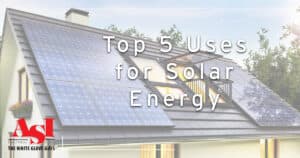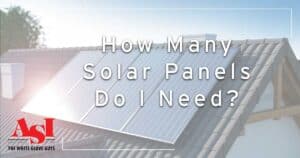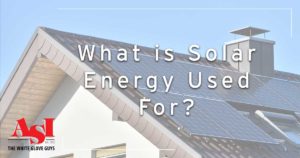Summer is one of the seasons when our utility bills are the highest. At ASI, we like to blame it on the hot, San Diego weather. For may homeowners, summer means they run their AC a lot more than they would run their heater, especially in SoCal. Inquiries about solar power seem to go up when days are longer and warmer. The one we’ve been hearing a lot is are solar panels more effective during the summer? It may have something to do with the sun staying out longer, but no matter what, we’re here to answer your questions.
How do Solar Panels Work?
First, don’t be intimidated by the large, glassy panels that sit on top of your neighbors’ roofs. Though they look complicated, they’re really not. Solar panels are made of tiny units called photovoltaic cells (PV). These PV cells link together to make a solar panel.
The panels themselves work when photovoltaic cells absorb particles of light. When these particles of light meet the solar panels, the PV cells themselves convert light into an electric current. The electric current then goes into an inverter, where it converts into an alternating current (AC), which is the power used in most residential homes. The AC then goes to the breaker box and from there directly supplies electricity into the home. Any excess electricity is directed to the community power grid.
Alternatively, some homeowners opt for a solar generator or solar batteries. These are options for saving backup power in case there is a power outage.
How Do Hot Temperatures Affect Solar Panels?
Solar panels are at peak efficiency in moderate climates. Much like beautiful San Diego. We’re lucky to see a mild winter, fall and spring. It’s only summer that gets a little uncomfortable. That summer weather also gets a little uncomfortable for your solar panels.
Solar panels work at peak efficiency when they’re between 59 ° and 95°. It’s important to remember that your solar panels will be much warmer than the ambient outside temperature. During a hot day, the solar panel itself can reach 149°. Just like any other electric item, solar panels can overheat. When they overheat, they are not as efficient. The laws of thermodynamics are correct when they say that with increased heat comes decreased power output.
However, this small decrease is usually nothing to worry about, it’s only a small decrease and nothing that will make a huge difference on any bill. At ASI, we work to counteract this by leaving a few inches between the roof and solar panel to allow for airflow, which will cool the unit.
Will Solar Panels Offset High Utility Bills?
One thing about living in San Diego is that we see a lot of sun all year round. This means we run our AC more often than not. We don’t need to tell you how this alone can make your electric bills go sky high. One of our favorite things about solar is that it helps reduce your utility bills and carbon footprint.
As we mentioned above, solar panels turn sun into electricity, that electricity goes directly into your home. This takes a huge chunk off your utility bills. Any extra electricity will go into the city’s power grid. The great thing is that San Diego Gas & Electric will credit your account for any excess energy that goes back into the power grid.
Want to Learn More About Solar? Call ASI, the While Glove Guys
Ready to learn more about how solar panels can benefit your home and lifestyle? We’re here for you. Simply dial the number at the top of the screen to speak with one of our friendly office staffers or click here to request an appointment online. Many of you know us as the White Glove Guys, but we like to think of ourselves as the good service and white glove guys. Our technicians go out of their way to make sure they deliver superior service to San Diego and surrounding communities.







